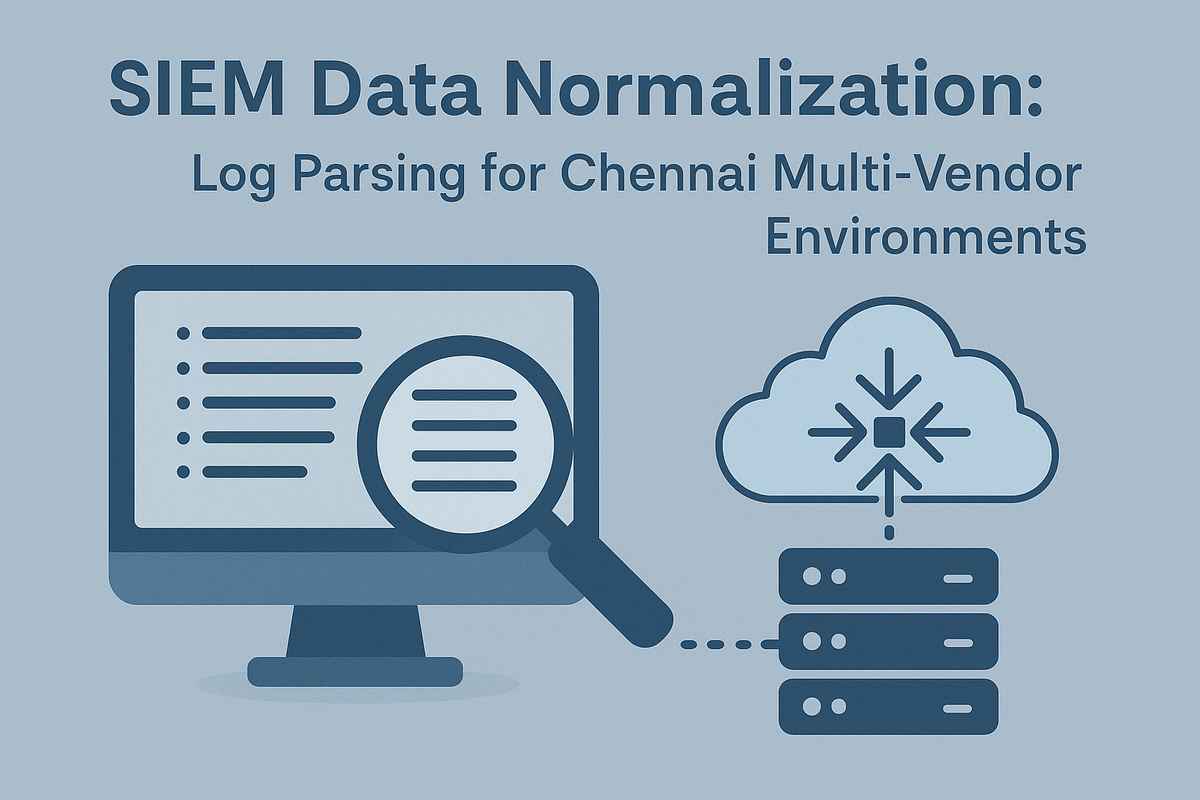SIEM Data Normalization: Log Parsing for Chennai Multi-Vendor Environments

Introduction: Why SIEM Data Normalization Matters in Chennai
SIEM data normalization standardizes logs from various sources, making threat detection, compliance, and forensics more accurate—especially important for Chennai’s IT, manufacturing, and regulated sectors. Centralized and standardized logging is vital for managing Chennai’s diverse enterprise IT ecosystems and regulatory requirements.
The Challenge of Multi-Vendor Environments
In Chennai, organizations typically use products from multiple vendors—Cisco, Palo Alto, AWS, Azure, application platforms, and legacy systems. Each solution emits logs in proprietary formats, complicating aggregation, correlation, and compliance reporting. Without normalization, SIEM systems struggle with blind spots and false positives, and Chennai organizations risk compliance failures.
Decoding SIEM Data Normalization
- Data normalization refers to mapping log entries to a standard schema: uniform field names, formats, timestamps, and data types.
- For instance, “userId”, “userid” and “uid” would all be normalized as “user_id”.
- Automated normalization is essential for scalability; robust SIEMs deploy AI-driven normalization for evolving log formats.
- Proper normalization ensures that events like “failed login” and “unauthorized access attempt” from different systems are analyzed contextually as the same incident type.
Step-by-Step: Log Parsing and Normalization Workflow
- Log Ingestion: Collect logs using agents, syslog, APIs, or cloud-native tools.
- Parsing: Break down unstructured log lines using regular expressions, pattern matching, and built-in log parsers. AI can suggest or automate rule creation for complex environments.
- Field Extraction: Identify and extract key event fields (IP addresses, usernames, timestamps, etc.).
- Normalization: Standardize field names, timestamp formats, IP address notation, and enrich logs with geo/IP/contextual data.
- Tagging and Categorization: Classify logs by type (system, application, security, network) for Chennai’s sectoral requirements.
Tools and Techniques for Chennai Businesses
- Open source: ELK Stack, Graylog, OSSEC—support flexible parsing and normalization configurations.
- Enterprise-class: Splunk, IBM QRadar, Palo Alto XSOAR, AWS CloudWatch, Azure Sentinel, Motadata—all with advanced normalization and compliance features.
- Many platforms provide in-built or user-contributed parser libraries for common Chennai use cases.
Chennai-Focused Compliance Considerations
- Adhere to India’s IT Act, RBI guidelines, DPDP Act, PCI-DSS, and GDPR if dealing with global clients.
- SIEM setups must mask or secure sensitive data in logs, aligned with local privacy and data residency mandates.
- Regular audits require easily retrievable, normalized, and tamper-proof log sets; log retention policies must strike a balance between legal obligations and storage management.
Overcoming Multi-Vendor Parsing Challenges
- Legacy hardware and cloud-native apps often output incompatible log schemas.
- Use automated parser generators or frameworks that leverage sample log entries to extract field names and data types using regex and mapping logic.
- Maintain an up-to-date log inventory and assign correct log parsers to new or unknown sources as soon as they appear in production.
- Regularly review and tune normalization policies and parser rules to account for infra/app changes and new compliance needs.
Best Practices for Chennai Enterprises
- Centralized Log Collection: Aggregate logs promptly from all sources, including remote branch offices and third-party integrations common in Chennai’s sector.
- Standardized Formats: Define and enforce standard schemas enterprise-wide before onboarding new apps or hardware.
- Automation at Scale: Leverage AI/ML features for parser updates, normalization, and anomaly detection—crucial for growing data volumes in Chennai.
- Contextual Correlation: Map normalized logs to business or regulatory contexts—for example, tying failed database logins to user activity during audit windows.
- Documentation and Audit Readiness: Maintain robust logs of parser changes, normalization rules, and SIEM alert logic—including Chennai-specific compliance mapping.
Example: Creating a Custom Log Parser and Normalizer
- Sample log entry: “2025-09-17 14:01:22 - User amar logged in from 192.168.1.15”
- Parsing: Use a regex to extract timestamp, username, event type, and IP address.
- Normalization: Map ‘logged in’ to the normalized field ‘login_success’, ensure timestamp is in ISO format, and standardize field names as ‘timestamp’, ‘user’, ‘source_ip’.
- In multi-vendor Chennai deployments, maintain a mapping table to unify event types from all critical systems.
Common Pitfalls and Solutions
- Data Gaps: Incomplete log sources or wrongly assigned parsers result in missed security events—continuously update source inventory and parser mappings.
- Manual Overload: Try to automate wherever possible; manual parsing and normalization can’t scale in the fast-growing Chennai IT/IoT environment.
- False Positives/Negatives: Fine-tune normalization and parser logic to ensure alerts are meaningful and context-aware.
Conclusion: SIEM Normalization Is Foundational for Chennai’s Cybersecurity Maturity
Chennai enterprises face a complex mix of legacy infrastructure, modern cloud, sector-specific compliance, and multi-vendor environments. SIEM data normalization and robust log parsing underlie effective threat detection, incident response, and audit readiness—delivering the comprehensive visibility modern organizations in Chennai require.
By following best practices for parser maintenance, normalization rules, automation, and local compliance, Chennai organizations can transform fragmented operational data into actionable security intelligence.
Take the Next Step with CodeSecure Solutions
Cyber threats are growing more sophisticated every day. With a trusted partner by your side, you can safeguard your business while focusing on what truly matters—growth and innovation.
At CodeSecure Solutions, we deliver comprehensive cybersecurity services in Chennai, uniquely tailored for startups, SMEs, and enterprises:
- Vulnerability Assessment & Penetration Testing (VAPT)
- Network Security Solutions
- Compliance Support (ISO 27001, PCI-DSS, HIPAA, DPDP Act, GDPR)
- Cloud & Endpoint Protection
- Security Awareness Training
No matter your industry or size, CodeSecure customizes solutions to fit your needs—ensuring your data, reputation, and operations remain secure.
Ready to Strengthen Your Defenses?
- 📞 Call: +91 73584 63582
- ✉️ Email: [email protected]
- 🌐 Visit: www.codesecure.in
Stay secure. Stay informed. Choose CodeSecure Solutions—your partner in cyber resilience.
